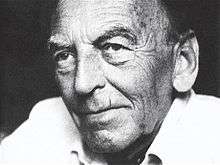Jiří Mucha
| Jiří Mucha | |
|---|---|
 Jiří Mucha (1915–91) | |
| Born |
March 12, 1915 Prague |
| Died |
April 5, 1991 (aged 76) Prague |
| Nationality | Czech |
| Occupation | Journalist, writer, screenwriter, author |
| Notable work | Za mořem, Ugle a cesta na konec světa, Most |
Jiří Mucha (March 12, 1915 in Prague – April 5, 1991 in Prague) was a Czech journalist, writer, screenwriter, author of autobiographical novels and studies of the works of his father, the Art Nouveau painter Alphonse Mucha.
Life
Born in Prague, he was working in Paris as a correspondent for Lidové noviny[1] when Germany occupied Czechoslovakia on March 15, 1939. It was at this time he wrote the Czech libretto for Martinu's Field Mass. He returned to Prague briefly for his father's funeral in July of the same year[2] but was able to return to Paris and later joined the newly formed Czech army in Agde. Following the fall of France, Mucha made his way to the United Kingdom, where he joined the Royal Air Force before becoming a war correspondent for the BBC.[3] He returned to Prague in 1945. In 1951 he was arrested by the country's Communist government for alleged espionage, and following the demands of the State Prosecutor for the death penalty, he was ultimately sentenced to hard labor in the Jachymov uranium mines. Released from prison in 1954 due to the efforts of his wife Geraldine,[3] he devoted himself to his writing and to publicizing his father's art. In 1989, following the Velvet Revolution, which brought down the communist regime, he became chairman of the Czech PEN club.[3] He died of cancer in 1991.
Journalist Charles Laurence in his book The Social Agent alleges that Mucha acted as a 'social agent' for the State Secret Service (StB). [4] These allegations, which are based not only on the statements provided by a former StB officer who tortured Mucha whilst he was in jail but also on the records in the Security Services Archive in Prague (Mucha was registered under the code name Anty),[5] are in dispute by his family.
Family
His first wife was Czech composer Vítězslava Kaprálová (1915–40). His second wife was Geraldine Thomsen-Mucha (1917–2012), a Scottish born composer who lived in Prague until her death on 12 October 2012. Mucha had two children: a son, John, now President of the Mucha Foundation, with his wife Geraldine, and a daughter, Jarmila Plockova,[6] with Vlasta Plockova.
Work
- Za mořem (1932)
- Ugle a cesta na konec světa (1941)
- Most (1943)
- Problémy nadporučíka Knapa (1945) (first published in English)
- Oheň proti ohni (1947)
- Spálená setba (1948)
- Skleněná stěna (1949)
- Válka pokračuje (1949)
- Čím zraje čas (1958)
- Pravděpodobná tvář (1963)
- Černý a bílý New York (1965)
- Alfons Mucha (1965) first published as Kankán se svatozáří (published in English in 1966)
- Studené slunce (1967) (first published in English)
- Marieta v noci (1969)
- Llydova hlava (1987)
- Podivné lásky [Au seuil de la nuit] (in French), 1991 [1988].
- Věčná zahrada (1994)
Some of Mucha's novels are autobiographical, e.g. Most [The Bridge], Studené slunce [Cold Sun] – reflecting his experience of a life in Stalinist prison – and Podivné lásky [Strange Loves] – his recollections of his relationship with Czech composer Vítězslava Kaprálová and the life of a Czech émigré community in Paris at the dawn of the World War II.
Notes
- ↑ "Jiří MUCHA", www.slovnikceskeliteratury.cz (in Czech), Czech Republic, retrieved 24 October 2014.
- ↑ Mucha 1991.
- 1 2 3 Zejda 1994.
- ↑ Laurence, Charles (2010-02-16), The daily beast (PDF).
- ↑ Social Security Archives
- ↑ Mucha Plockova.
Bibliography
- Sarvas, Rostislav. "Hedvabny kanibal." Reflex 4 (1992): 30–34.
- Sleevenotes to Lloydova hlava. Prague: Mata, 1999.
- "Ustavni soud naridil znovu projednat Muchovo dedictvi." Mlada fronta Dnes, 9 November 2005.
- "Valecny denik Jiriho Muchy." Reflex 23 (2004).
- Wanatowiczova, Krystyna (30 May 2005), "Stara dama strazi pevnost", Tyden (online ed.), retrieved 4 June 2005.
- Zejda, Radovan (1994), "Jeden ze zapovezenych", Vecna zahrada (afterword), Trebic, CZ: Arca JiMfa.
External links
- Jiri Mucha et l'invasion de la Tchécoslovaquie, Radio Canada - an interview with Jiri Mucha. A rare film document featuring Jiri Mucha.
- “The Social Agent” exposes Czech writer Jiří Mucha as secret police agent, Radio Prague (Czech Radio International).
- Czechs in History, Radio Prague (Czech Radio International).
- "Jiri Mucha", Ceske filmove nebe, CZ, a version of IMDb database.
- The Mucha Foundation.
- Mucha family history, Mucha Plockova.
- Charles Laurence.